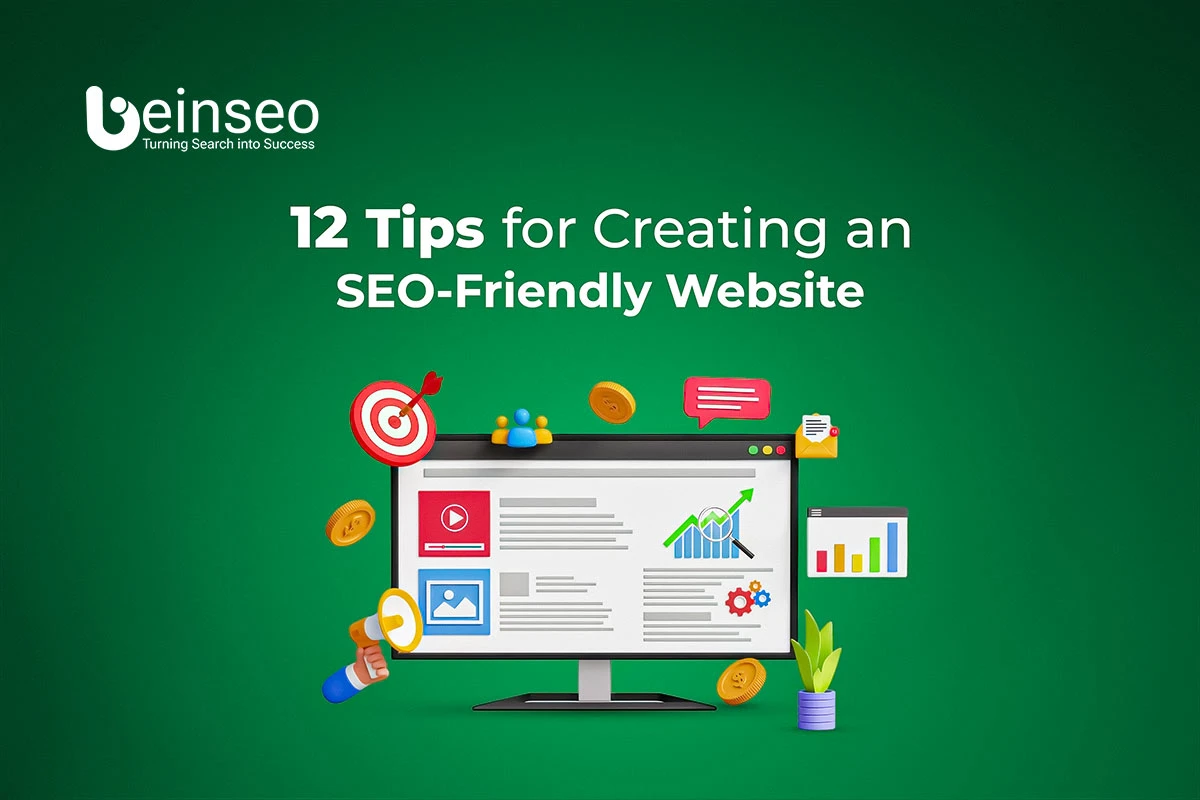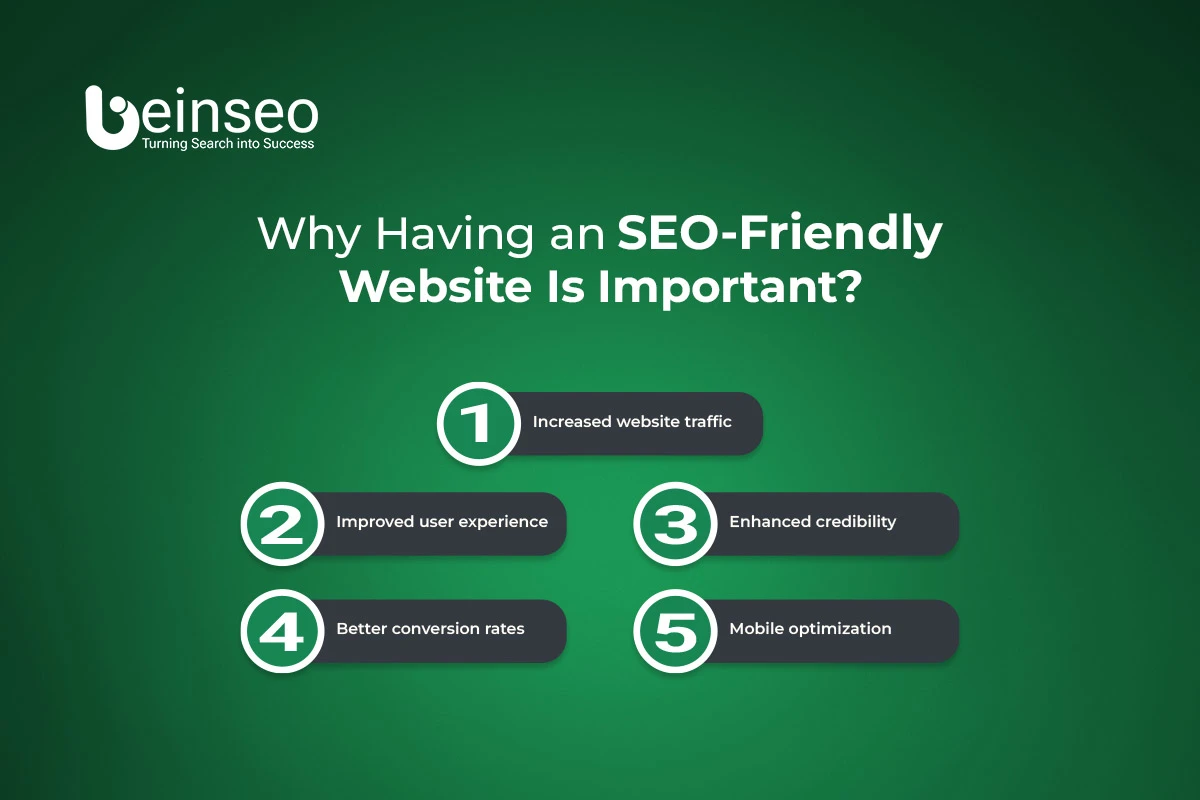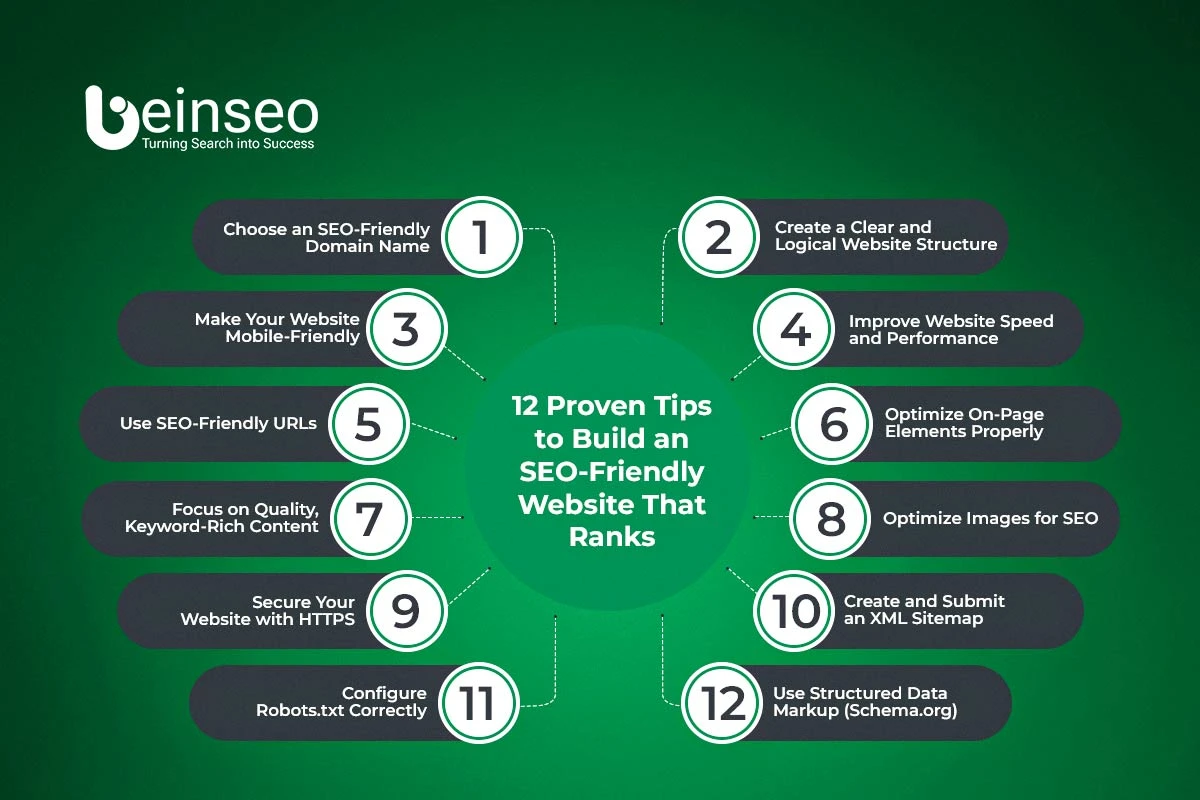#1 SEO Company Dubai
#1 SEO Company Dubai
Sun-Thu: 10 AM to 7 PM - Sat-Fri: Closed

An SEO-friendly website is not an option but a requirement in this digital era. An SEO-friendly website is a website designed and coded in such a way that the search engine is able to crawl, index, and understand its content easily, so that the site rises higher in the rankings of the search engine results pages (SERPs).
Getting this foundation right can be the difference between a site that languishes in obscurity and one that draws steady, relevant visitors who convert into loyal customers.
In this blog, we will explore 12 essential tips for creating an SEO-friendly website, highlight its importance, and outline common mistakes to avoid.

Respecting the value of an SEO-optimized website puts the right mindset in your design and build cycle.

To develop a website that is not only beautiful but also ranks near the top of Google, use these 12 advanced strategies.
A good domain name is brief, memorable, and consistent with your brand name. It will typically include a keyword for your niche so that the user and the search engine are notified of your path. A brief domain name also enhances the shareability and memorability our small business SEO services ensure your branding supports discoverability..
A domain that's optimized for SEO will set up that desirable number-one spot and brand awareness. It greets your user with their first impression and signals relevance to the search engines. Wising up is the key to your web presence.
An organized website hierarchy keeps your content shippably separated. The pages are easier for the engine to crawl and for pages to be indexed. Logical navigation makes the user experience better and the bounce rate lower.
Simple hierarchy definitions enable people to locate their needed content in a short period. Internal linking ties together related pages and complements keyword plans. Efficient organization optimizes the site's performance, in general, for SEO.
Since the majority of the audience is being reached through mobile, mobile-responsive design is a necessary. Responsive design resizes perfectly across all resolutions and screen sizes. That equates to quick loading and avoiding user abandonment.
Mobile optimization also significantly affects your search rankings. Google's mobile-first indexing policy rewards pages that provide excellent mobile experiences. You need to invest in mobile responsiveness on your site so that you retain traffic and provide conversions.
Page speed contributes significantly to SEO rankings, and user satisfactions. The quicker the pages, the fewer bounces and the longer they keep people on site. Optimize images, minimize code, and cache to make a huge impact.
Better performance builds confidence, and that reassures the visitor that you're interested in their experience. High speed is desirable in the opinion of the search engines, a sign of a well-maintained site. Regular checking and optimization of performance indicators is often vital.
SEO-friendly URLs are keyword-rich, short, and informational. They are user-readable as well as search engine-readable. They improve click-through rates by providing clarity on what the page offers.
With tidy, well-tended URLs, you avoid technical problems of content duplication. Tidily sorted URL benefits your whole search approach through heightened relevance of the page. With this small adjustment, digital discoverability is greatly optimized.
The most important on-page SEO factors are the header tags, the meta descriptions, and the title tags. They guide search engines on the topic and importance of your content. Each element should be clear, unique, and keyword-optimized our on-page SEO services cover title tags, header tags, and meta descriptions.
Proper on-page optimization also increases the user experience. Neatly maintained meta descriptions yield searches. Uniformity in such areas communicates something about usability and quality to the user and the search engine.
High-quality content is the key to an effective SEO strategy. It must cover the user intent and integrate the associated keyword naturally. High-quality content makes individuals visit your website and retain them for longer periods.
Regularly updating your content keeps it fresh and relevant. Well-researched articles can position your website as an authority in your field. Accurate content forges sharing and credibility, casting a shadow on your SEO.
Image SEO is achieved through alt text descriptions and file compression. The faster loading of images equates to improved overall site performance. Accessibility is gained through alt text, and context is given to the search engine.
Image SEO techniques, including alt tags and compression, help drive traffic from Google Images and improve accessibility. These reduce the loading time and delivers a smooth user experience. The image optimization itself is a very often neglected aspect of the entire SEO.
Switching to HTTPS establishes trust in your users with increased security. HTTPS secures data, protecting sensitive user information. This secure connection is now a key ranking factor in search engines.
A site being secure also reflects professionalism and integrity. Secure sites are preferred by the search engines and are ranked better. Having an SSL certificate is fundamental in the contemporary management of sites.
XML sitemap is a blueprint to the search engine regarding your site organization.It ensures that all important pages are discovered and indexed promptly. Requesting the sitemap using Google Search Console enhances the visibility of your site.
This proactive approach keeps your SEO strategy in check by addressing potential crawl issues.The procedure enables easy indexing for the search engines. A regularly updated sitemap ensures that new content is addressed on time.
The robots.txt file instructs the site's search engine crawlers which pages to index. The useful pages are not accidentally excluded in the proper configuration. It is also an indication of how the site is being perceived by the search engine.
Misconfigurations can lead to severe SEO penalties, so regular audits are essential. Properly designed robots.txt prevents redundant or repetitive crawling across pages. The file results in a clean and focused SEO plan through crawling behavior optimization.
Structured markup, like Schema.org, lets the search engine better understand your content. It structures your content in forms that are most commonly used, for example, reviews, products, or events. It then provides improved search results like rich snippets.
By taking advantage of structured data, you also see higher click-through rates and prominence. It makes inert listings exciting search results that invite greater interactions. Structured data is the solution of the new age that enhances user confidence as well as SEO.
While optimizing, many websites fall into traps that limit their SEO potential. Avoid these pitfalls to maintain a strong search presence:
fast, user-focused, and search engine-optimized experience from the ground up. From choosing the right domain name to implementing structured data, each tip outlined above plays a vital role in helping your site rank higher, load faster, and convert better.
If you're ready to boost your website’s visibility and performance, BeinSEO is here to help. Our expert team specializes in designing and optimizing websites that not only look great but also deliver real SEO results.
👉 Contact us today at beinseo and let's build a website that ranks, engages, and grows your business online!
An SEO-friendly website is fast, mobile-responsive, secure, well-structured, and contains optimized content and technical elements that help search engines crawl and rank it effectively.
Use tools like Google Search Console, SEMrush, or Ahrefs to audit your site’s SEO health, including speed, mobile usability, indexing status, and keyword rankings.
Yes, with a thorough SEO audit and strategic improvements such as optimizing content, enhancing site speed, fixing technical issues, and ensuring mobile responsiveness, you can make an existing site SEO-friendly.
SEO results vary, but typically it takes 3 to 6 months to notice significant improvements, depending on competition, site authority, and the quality of optimizations.
© copyright 2025 All rights reserved. BeinSEO